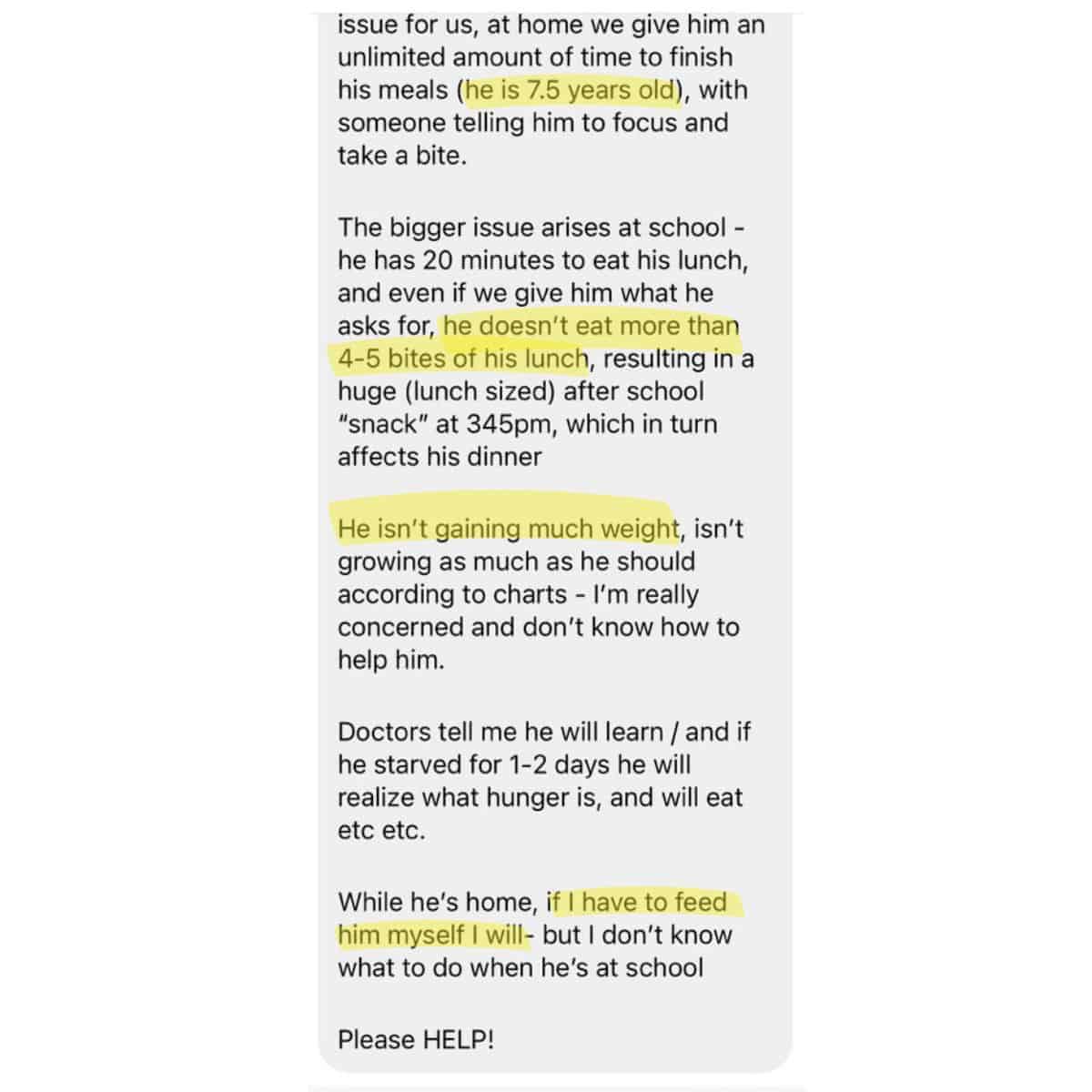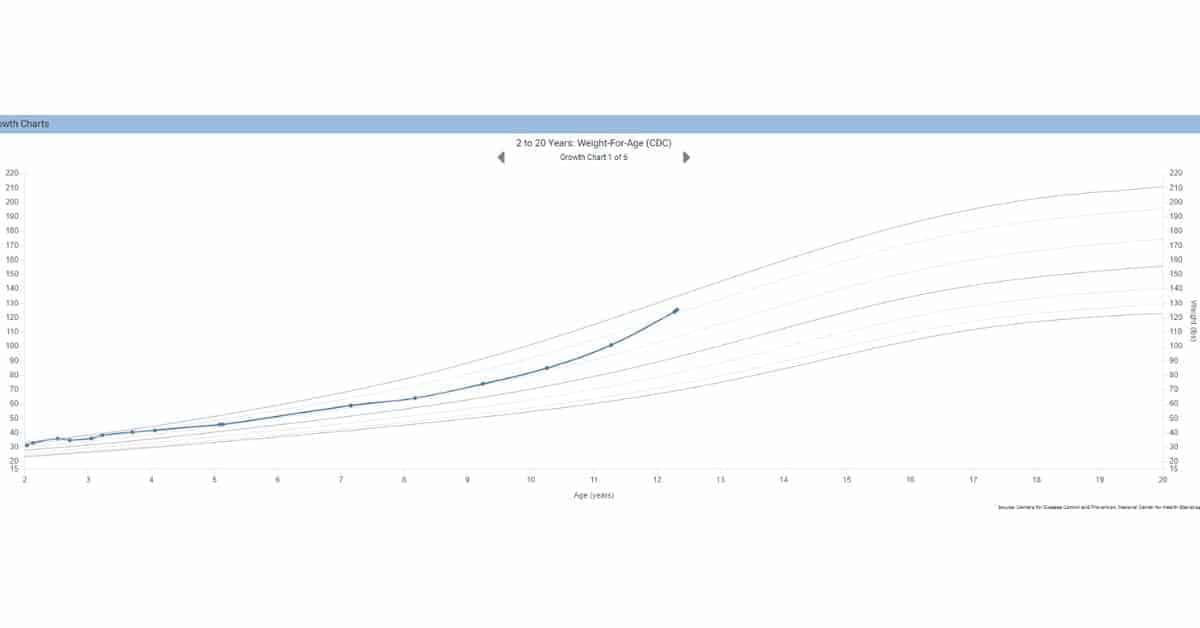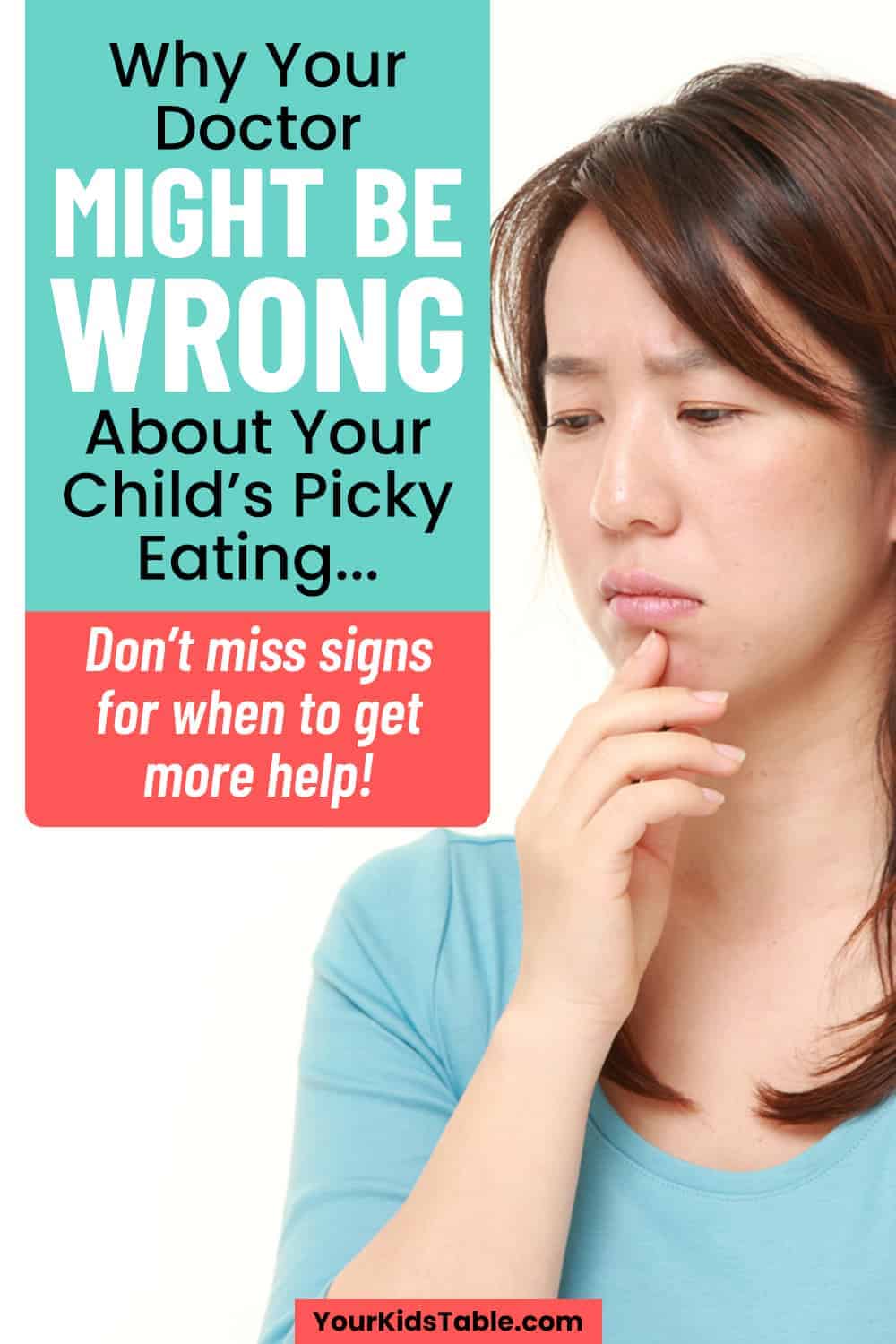Be wary of this dangerous advice about kids that are VERY picky eaters from your child’s doctor. Learn what signs to look for and what you can do if you aren’t getting the help you need…
I wish I could say this rarely happens.
That it’s a fluke, but in the last decade, I’ve received 100’s, maybe 1000’s, of messages from parents who tell me their kid is only eating a handful of foods and mealtimes are very stressful, but when they talk to their pediatrician, they say their child is fine.
Or, they’ll grow out of it.
Before I go any further, I realize that not all pediatricians or family doctors dispense this advice. There are some docs who have gone the extra mile to learn more about picky eating, or what’s called feeding issues in the medical community.
Unfortunately, those doctors seem to be the exception, not the norm.
As a pediatric occupational therapist, the advice to wait out picky eating, or that “they’re fine“, is dangerous.
I see the repercussions of it all the time as students in our Mealtime Works program often tell me, “I feel like I messed up because my kid is 5, 6, 7, 8, 9, 10, 11, 12, 13+ years old and I didn’t do anything sooner.”
Hardly the parents fault when they were repeatedly advised not to worry about it.
That’s why we end up with desperate messages from parents. Recently, we got this dm on Instagram that both infuriated and broke my heart for the lack of guidance and frankly incorrect advice this mom was receiving:

What’s Wrong With This Advice…
In this particular message, there are a few key pieces of information this mom told me that show me this child needs more help. This isn’t just average picky eating:
- He’s 7.5 years old (how much longer should this family wait???)
- He’s taking a very long time to eat and finish his meals (any child, at any age, taking a long time to chew or eat should get more help)
- Low weight gain (even extreme picky eaters that aren’t losing weight often need help)
- Parents have to physically feed him (By 2 years old, kids should be able to eat themselves)
This particular mom had a double whammy of bad advice to sort through, because not only are the doctors (moms obviously asked several) not giving her any help, they’re telling her to do something that’s potentially very harmful:
“He will learn if he’s starved for 1-2 days. He will realize what hunger is, and will eat.”
This is false.
Children with extreme picky eating, or rather feeding difficulties, often will not eat when they get hungry enough. Eating is so very hard for them that they can not eat.
Instead, they’ll often start vomiting up bile as their stomach wretches from no food, and then they’ll end up in the ER on fluids. I’ve seen this happen.
Yes, it’s true, many average picky eaters can take this approach of starving them out, but it can have negative consequences on any child’s mental health, relationship with their parent, and affect the way they view food for the rest of their life.
The One Thing That Gets MOST Pediatrician’s Attention
There is an exception of course. Pediatricians will only tell parents not to worry about their child’s very picky eating habits IF they are growing well. (Unfortunately, this wasn’t the case with the child in the message above.)
Doctors look at their growth chart, which has every weight registered in the doctors office plotted on it. As long as a child is staying on their trajectory for weight, or what’s referred to as their “growth curve”, then they usually aren’t too concerned.

(Even though very picky eaters are limited in what they eat, most of them eat enough of the foods they like or drink enough milk or formula to keep the amount of calories they need in them to grow.)
The doctor then compares your child’s growth curve to averages from a wide sample of kids that are the same age, and can then tell you what percentile your child is in.
Most kids are going to range from the 30th to 70th percentile for their weight and height.
Of course, some kids will be in lower and higher percentiles. However, even if your child is in the 5th percentile, and therefore a low weight for their age, it’s not concerning if they’ve always been in or around the 5th percentile.
This is even more true if the biological parents are also in lower weight and height percentiles, or were when they were kids.
If your child has steadily been in the 35th percentile and over the last few doctors visits they’ve dropped to the 15th percentile though, that’s a big red flag for your doctor.
And, it should be!
At this point, doctors will often suggest a nutritional high calorie shake and hopefully feeding therapy, but more often a referral to a dietician.
Dieticians and nutritionists are great, but many don’t have any advanced training in how to help picky eaters learn to eat new food. If that’s the case, parents of extreme picky eaters are often left feeling frustrated as they hang their hopes on the first appointment with the dietician to find that they tell them all the areas their child is nutritionally lacking and a long list of foods their child should eat.
If you’re the parent of an extreme picky eater, you know the problem isn’t knowing which foods to feed your kid, it’s that they won’t eat any other foods.
Signs Your Picky Eater Needs More Help
(Even if your doctor is telling you otherwise.)
Picky eating is a very broad term that’s used to describe any child that doesn’t like their veggies, as well as a child that has great stress around new food and will only eat 4 foods on a regular basis.
I often use the term “extreme picky eating” to define that some kids are beyond average picky eating, as the boy in the message is.
Thankfully, in the fall of 2021 a new diagnosis was created, Pediatric Feeding Disorder to formally differentiate kids that need more help, well beyond the average picky eating advice.
You can read more about Pediatric Feeding Disorder here, but the point isn’t to worry if your child has this diagnosis. It’s to know what the signs are because if your child has PFD or what I’ve called extreme picky eating, they need help. This kind of picky eating often doesn’t go away on its own.
Signs of PFD or Extreme Picky Eating:
- Eats less that 15 foods
- Has difficulty chewing or swallowing
- Gags at the sight, smell, touch, taste of food, or frequently while trying to chew/swallow
- Takes longer than 30 minutes to eat a meal
- Will only eat while watching a screen or while being distracted
- Doesn’t eat age appropriate foods (Ex: 2 year old still eating only baby food)
- Mealtimes are very stressful with crying, tantrums, throwing food, etc.
- Will only eat specific brands of food or if they’re prepared a certain way.
Your child may have just a few of these signs, they don’t need to have them all. And, this applies to babies as young as 10-11 months old on up through the teen years.
If you have a question about the signs you’re seeing in your child, leave it in the comments below.
How to Get More Help for Your Picky Eater
There a couple of ways that you can get more help. First, you are in the right place. We have lots of resources for parents, and our biggest one of the year is available right now:
3 Keys to Finally Turn Your Picky Eater Around
You can sign up for the workshop here, it is designed to give parents key steps they can take to start helping their extreme picky eater or kids with PFD start to eat new foods and have mealtimes be way less stressful.
Second, is to get a feeding therapy evaluation. If you need a doctor’s referral, and your doctor won’t budge, get a second and third opinion. But, in many cases, you can simply schedule your own evaluation.
Even if you go with the feeding therapy option, make sure you come to the free mini course too so that you have tools to use at home to support your kid’s eating in between feeding therapy sessions.
Any questions or need some support? Leave us a comment below!
Alisha Grogan is a licensed occupational therapist and founder of Your Kid’s Table. She has over 18 years experience with expertise in sensory processing and feeding development in babies, toddlers, and children. Alisha also has 3 boys of her own at home. Learn more about her here.

OMG finally beginning to feel, it’s not just me!
My 6 year old son (my youngest of 3) is absolutely an extreme picky eater.
It is infuriating, saddening, frustrating and so confusing.
I feel like all of my passion for food has been drained when I have my youngest two (I have them week about). I find myself dishing up the extreme plain food, and he even refuses that!
He is being spoon fed at his Dad’s and from what I hear the menu is very limited.
He definitely does not eat vegetables or fruit and even with bribes he is happy to eat nothing ;(
My son is very picky at home, but at school he seems to eat everything according to his teachers. We’ve even verified with them, because we didn’t believe he was eating things like beef and mushroom bolognese. (He attends a daycare through the hospital system we work for, and they serve “healthy” menus repeated each month)
He’s 3.5 years old. The o ly thing his teachers can think of is that he sees the other children eating.
Any tips for us to help him at home??
Hi Chelsea! Thanks for reaching out! What you described is so very common with young kiddos! They are easily influenced by other children at daycare/school, and therefore tend to eat more/better there than at home. For home eating, try involving him with the mealtime process- having him help cook, pick out the food at the store, choose between food items, etc. Have everyone sit at the table and eat together, making sure to minimize other distractions. Serve everyone the same meal, that way he sees everyone eating the same thing and will hopefully feel inspired to eat his food too! Hope this helps!
Best,
Kalyn
I am an early childhood home visitor. I don’t come across this issue very often but when I do I’m always uncertain as to how to help the family. My main question is how to find a clinic that does feeding evals? I don’t know where to refer families so that their concerns are heard and addressed.
Hi Carol! Great question! We actually have a blog post that talks more about this in detail, here. The best places for obtaining an eval would be a hospital/clinic, private clinic, early intervention, or a child’s school. Essentially, for finding a clinic, they would want to first check with their insurance to see what is covered. Then, they could just do a simple Google search for feeding therapy in their city. Hope that helps!
Best,
Kalyn